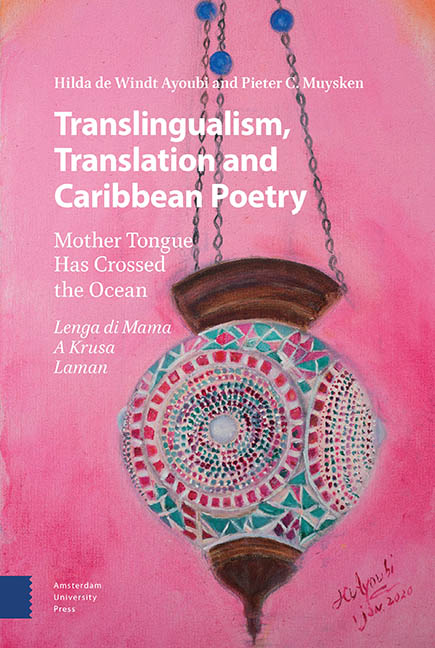Book contents
- Frontmatter
- Dedication
- Contents
- How to Navigate This Book: Kon Nabegá den e Buki akí
- Acknowledgements
- Preface
- Part 1 Introducing the Mother Tongue: Introdukshon di Lenga di Mama
- Part 2 The Poem “Lenga di Mama” and its Translations, Comments and Language Descriptions E Poema “Lenga di Mama” i su Tradukshonnan i Komentario i Deskripshon di e Idiomanan
- Part 3 The Poem “E ‘papiá’ di Papiamentu” and its Translations E Poema “E ‘papiá’ di Papiamentu” i su Tradukshonnan
- Part 4 The Poem “Papiamentu pa Semper” and its Translations E Poema “Papiamentu pa Semper” i su Tradukshonnan: The Translations and Editing of the Poem Hilda de Windt Ayoubi and Pieter Muysken (for Dutch)
- Part 5 The Poem “Riba Ala di Lenga di Mama” and its Translations E Poema “Riba Ala di Lenga di Mama” i su Tradukshonnan
- Part 6 Commentary: Komentario
- Note on the Authors: Informashon tokante e Outornan
- Index: Índise
Germanic Languages: Idioma Germániko
Published online by Cambridge University Press: 15 September 2022
- Frontmatter
- Dedication
- Contents
- How to Navigate This Book: Kon Nabegá den e Buki akí
- Acknowledgements
- Preface
- Part 1 Introducing the Mother Tongue: Introdukshon di Lenga di Mama
- Part 2 The Poem “Lenga di Mama” and its Translations, Comments and Language Descriptions E Poema “Lenga di Mama” i su Tradukshonnan i Komentario i Deskripshon di e Idiomanan
- Part 3 The Poem “E ‘papiá’ di Papiamentu” and its Translations E Poema “E ‘papiá’ di Papiamentu” i su Tradukshonnan
- Part 4 The Poem “Papiamentu pa Semper” and its Translations E Poema “Papiamentu pa Semper” i su Tradukshonnan: The Translations and Editing of the Poem Hilda de Windt Ayoubi and Pieter Muysken (for Dutch)
- Part 5 The Poem “Riba Ala di Lenga di Mama” and its Translations E Poema “Riba Ala di Lenga di Mama” i su Tradukshonnan
- Part 6 Commentary: Komentario
- Note on the Authors: Informashon tokante e Outornan
- Index: Índise
Summary
Abstract
The family of Germanic languages is mostly spokenin northwestern Europe. It includes theScandinavian languages, German, Frisian and Dutch,and also English. In this section we includetranslations into some of the standard languages,but also into non-standard language varieties andin one case into a dialect cluster,Brabantish.
Keywords: Northwestern Europe,Scandinavian, Alemannic, South Africa, Dialect,Regionalism
Dansk sprog (Danish) is a Scandinavianlanguage spoken primarily in Denmark, in Greenland,and in Southern Schleswig in Germany, across theDanish border. Many find it hard to learn as asecond language, in part because of its many vowels(it has 27 of them) and 19 diphthongs. When learningindefinite nouns, the article precedes the noun,while with definite nouns it is attached to it.Thus, we have Jeg sa ethus. “I saw a house” and Jeg sa huset “I saw thehouse” and in the translation of the poem landet “the land”. Manywriters have published in Danish, a traditionestablished in the Middle Ages. Outside of Denmark,perhaps the best known are Hans Christian Andersenfor his children's tales and the philosopher SorenKierkegaard. Modern Danish literature is thrivingand many of its works are translated into otherlanguages.
German is an important language spokenprimarily in Germany, Austria, and Switzerland. Ithas a rich history and a vast literature. It has astandard written form but there is much regionalvariation. Someone from Bavaria speaks differentlythan someone from Berlin. In these territories, andin other areas in central Europe where German usedto be a literary language, great literary works haveappeared over the past millennium. German, Austrianand Swiss authors are core figures in the Europeancultural landscape. German also used to be animportant scientific language, but this is less ofthe case now.
Swiss German (also called Schweizerdeutsch or locallySchwiizerdutsch isclosely related to the German of the larger northernFederal Republic and Austria, and coexists withstandard German in Switzerland itself. However, ithas many distinct features. It is part of the groupof Alemannic dialects of German, and there are manygrammatical differences from standard German.
- Type
- Chapter
- Information
- Translingualism, Translation and Caribbean PoetryMother Tongue Has Crossed the Ocean, pp. 143 - 172Publisher: Amsterdam University PressPrint publication year: 2022



